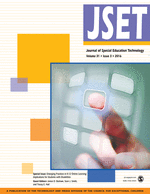
Journal of Special Education Technology
Scope & Guideline
Enhancing Outcomes Through Technological Insights
Introduction
Aims and Scopes
- Technology Integration in Special Education:
The journal publishes research on how various technologies can be integrated into special education practices to enhance learning experiences for students with disabilities. - Assistive Technology Development and Evaluation:
It covers studies focused on the development, implementation, and evaluation of assistive technologies designed to support individuals with disabilities in academic and social contexts. - Instructional Strategies Using Technology:
Research that explores instructional strategies that leverage technology to improve teaching practices and learning outcomes for students with special needs is a core focus. - Professional Development for Educators:
The journal highlights the importance of training and professional development for educators in utilizing technology effectively to support diverse learners. - Research on Learning Outcomes:
It emphasizes empirical studies that assess the impact of technology-based interventions on educational outcomes for students with disabilities.
Trending and Emerging
- Virtual Reality and Augmented Reality Applications:
There is an increasing interest in using virtual and augmented reality to create immersive learning experiences for students with disabilities, enhancing engagement and skill acquisition. - Artificial Intelligence in Education:
Research exploring the use of artificial intelligence tools to support special education practices is on the rise, indicating a growing recognition of AI's potential to personalize learning. - Remote and Online Learning Technologies:
The journal has seen a surge in studies addressing the effectiveness of online learning technologies, especially in light of recent global shifts towards remote education due to the pandemic. - Social-Emotional Learning Technologies:
An emerging focus on technologies that support social-emotional learning for students with disabilities highlights the importance of holistic educational approaches. - Data-Driven Decision Making:
There is a growing trend towards using data analytics and technology to inform instructional practices and improve educational outcomes for students with disabilities.
Declining or Waning
- Traditional Teaching Methods:
There has been a noticeable decline in research centered around traditional teaching methods without the integration of technology, indicating a shift towards more innovative technological approaches. - General Special Education Practices:
Research that deals with general special education practices, without a specific focus on technology, has become less frequent, as the journal increasingly prioritizes technology-enhanced methodologies. - Non-Digital Assessment Tools:
The use of non-digital assessment tools in special education research appears to be waning, as the focus shifts towards digital and technology-driven assessment methods. - Physical Classroom Strategies:
There is a reduced emphasis on physical classroom strategies that do not incorporate technology, suggesting a move towards digital solutions that facilitate learning in diverse environments. - Single-Subject Research Designs:
While still relevant, there seems to be a decline in studies utilizing single-subject designs without technological integration, potentially reflecting a broader trend towards group studies and large-scale evaluations.
Similar Journals
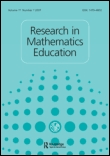
Research in Mathematics Education
Exploring New Dimensions in Mathematics Education ResearchResearch in Mathematics Education is a premier academic journal published by Routledge Journals, Taylor & Francis Ltd, focusing on the critical field of mathematics education. Established in 1998, this journal has earned a reputation for fostering innovative scholarship and research that advances the understanding of teaching and learning mathematics. With its impressive Q2 ranking in both Education and Mathematics (miscellaneous) categories for 2023, and a notable Scopus rank of 60th in General Mathematics, it serves as a vital resource for researchers, educators, and policymakers alike. While it does not offer Open Access, the journal’s rigorous peer-reviewed framework ensures that only high-quality articles are published, contributing significantly to both theoretical and applied aspects of mathematics education. Its commitment to excellence is reflected in its ongoing aim to disseminate impactful research, making it an indispensable resource in the academic and educational communities.

Computers and Education Open
Empowering educators with innovative insights.Computers and Education Open is a pioneering open access journal published by Elsevier that focuses on advancing the field of educational technology and digital learning methodologies. Since its inception in 2020, the journal has provided a platform for researchers, educators, and practitioners to disseminate innovative findings and share insights related to the integration of computing technologies in educational settings. With its ISSN 2666-5573, this journal aims to bridge the gap between technology and education, fostering a collaborative environment for those dedicated to enhancing learning experiences through computational tools. Leveraging the rigorous standards of Elsevier's publishing excellence, Computers and Education Open attracts high-quality research that influences pedagogical practices and educational policies globally. The open access nature of the journal ensures that valuable knowledge is freely accessible, making it an essential resource for academics and professionals looking to stay at the forefront of educational advancements.

International Journal of Instruction
Elevating the discourse in education through peer-reviewed scholarship.International Journal of Instruction is a distinguished peer-reviewed journal dedicated to advancing the field of education through high-quality research and innovative instructional practices. Published by GATE Association for Teaching & Education in Switzerland, this open-access journal has been a beacon of knowledge since its inception in 2008, ensuring that impactful educational research is freely accessible to scholars, educators, and practitioners worldwide. With an impressive Q2 ranking in Education and a notable position in the 80th percentile within its category in Scopus, the journal showcases cutting-edge studies and discussions that reflect current trends and methodologies in teaching and learning. The scope of the journal includes a wide array of topics, ranging from instructional strategies to curriculum development, making it a vital resource for anyone engaged in the dynamic landscape of education. Explore the International Journal of Instruction today to contribute to and benefit from the collective wisdom of the global educational community.
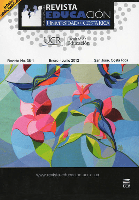
Revista Educacion
Connecting Scholars to Transform Educational PracticesRevista Educación is a prestigious academic journal published by Universidad de Costa Rica, Editorial, dedicated to advancing the field of education through scholarly research and innovative pedagogical practices. Established as an Open Access journal since 1977, it aims to provide unrestricted access to high-quality research, fostering a collaborative environment for educators, researchers, and students to share knowledge and insights. With a commitment to addressing contemporary educational challenges in Costa Rica and beyond, Revista Educación serves as a vital forum for disseminating original research articles, case studies, and theoretical discussions that engage a diverse audience. The journal’s dedication to enhancing educational practices makes it an essential resource for those seeking to contribute to the field of education while promoting inclusive and equitable access to educational resources.

Journal of Research in Special Educational Needs
Advancing Knowledge in Special Educational NeedsJournal of Research in Special Educational Needs, published by WILEY, serves as a vital resource for scholars and practitioners within the field of special education. This esteemed journal, with an ISSN of 1471-3802 and E-ISSN of 1471-3802, is recognized for its contribution to advancing our understanding of the educational needs of diverse learners. With a commendable impact factor and a current ranking of Q2 in Education, it showcases high-quality, peer-reviewed research that emphasizes evidence-based practices, innovative strategies, and policy implications relevant to special educational needs. The journal has been converging valuable insights since 2007 and is indexed within Scopus, with a notable position in the 64th percentile of Social Sciences - Education. The journal's commitment to inclusivity and accessibility makes it an essential platform for researchers, professionals, and students looking to enhance their knowledge and practice in this important field.
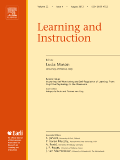
LEARNING AND INSTRUCTION
Shaping Learning Landscapes with Groundbreaking ResearchWelcome to the esteemed LEARNING AND INSTRUCTION journal, a pivotal publication in the fields of educational science and developmental psychology, published by PERGAMON-ELSEVIER SCIENCE LTD. With a remarkable Impact Factor reflective of its quality (ranking in Q1 across its categories), this journal serves as a crucial platform for disseminating research that transforms the understanding of learning processes and instructional methodologies. Since its inception in 1991 and extending through 2024, LEARNING AND INSTRUCTION has consistently provided insights crucial for educators, researchers, and students alike, positioning itself among the top journals in both the Social Sciences - Education and Psychology - Developmental and Educational Psychology categories. Its rigorous peer-review process ensures that only the most impactful research reaches its readers, making it a must-read for anyone engaged in the enhancement of educational practices and learner outcomes. While it operates on a subscription model, the knowledge gained through its pages is invaluable for shaping the future of education.
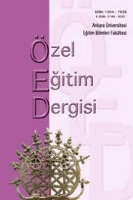
Ankara Universitesi Egitim Bilimleri Fakultesi Ozel Egitim Dergisi-Ankara University Faculty of Educational Sciences Journal of Special Education
Fostering collaboration for special education excellence.Ankara Universitesi Egitim Bilimleri Fakultesi Ozel Egitim Dergisi (Ankara University Faculty of Educational Sciences Journal of Special Education) is a premier, peer-reviewed journal dedicated to the dissemination of high-quality research in the field of special education. Published by ANKARA UNIV, FAC EDUCATIONAL SCIENCES and made available as an Open Access publication since 2015, this journal caters to a global audience of researchers, educators, and practitioners committed to advancing the knowledge and practices in special education. With an ISSN of 1304-7639 and an E-ISSN of 2149-8261, the journal aims to foster impactful discussions and collaborations in educational sciences, focusing on innovative methodologies, inclusive practices, and effective interventions. Its commitment to open access ensures that vital research is accessible to all, thus enhancing the educational landscape. By prioritizing rigorous scholarly contributions, the journal plays a key role in shaping the future of special education in Turkey and beyond.

Rural Special Education Quarterly
Fostering Change: Research-Driven Solutions for Rural EducationRural Special Education Quarterly, published by SAGE Publications Inc, is an esteemed journal that focuses on the nuanced challenges and best practices in special education within rural contexts. With an ISSN of 8756-8705 and an E-ISSN of 2168-8605, this journal serves as a vital resource for researchers, educators, and policymakers interested in the intersection of rurality and special education. Spanning from 2015 to 2024, it boasts impressive rankings, holding a Q2 status in both Development and Education categories, attesting to its influence and credibility within the academic community. Apart from being rigorously peer-reviewed, Rural Special Education Quarterly aims to disseminate innovative research, offer a platform for diverse voices, and present practical insights that are crucial for enhancing educational equity in rural settings. Though it operates under a traditional access model, the journal’s commitment to fostering dialogue and advancing scholarship makes it indispensable for those dedicated to improving special education practices in the United States and beyond.
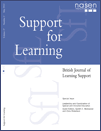
Support for Learning
Empowering Educators with Evidence-Based InsightsSupport for Learning is a prestigious academic journal published by Wiley that focuses on the crucial aspects of educational research and practices. With an ISSN of 0268-2141 and an E-ISSN of 1467-9604, this journal has been at the forefront of educational discourse since its inception in 1986, and continues to contribute valuable insights and findings through to 2024. The journal's scope encompasses various facets of learning support, catering to educators, researchers, and practitioners in the fields of education and social sciences. Ranked in the Q3 category in Education and positioned at 907 out of 1543 in the Scopus Education rankings, Support for Learning is not only recognized for its academic rigor but also plays a pivotal role in shaping effective educational strategies. While currently not offering open access, the journal provides significant contributions to the ongoing discussions in learning support methodologies, making it an essential resource for anyone committed to advancing educational practices.
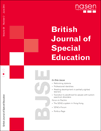
British Journal of Special Education
Empowering Minds, Transforming FuturesThe British Journal of Special Education, published by WILEY, serves as a pivotal resource in the fields of educational psychology and special education. With an impactful legacy dating back to 1974 and progressing through to 2024, this journal presents rigorously peer-reviewed articles that address current challenges, innovations, and research findings pertaining to special education practices in the United Kingdom and beyond. Although it does not operate under an Open Access model, its subscription-based access ensures that each publication reaches a dedicated audience of researchers, educators, and professionals committed to enhancing educational outcomes for individuals with special needs. Ranked in the third quartile in both developmental and educational psychology and education categories by Scopus in 2023, the journal plays a crucial role in advancing the dialogue on inclusive educational practices. Articles published in this journal attract diverse contributions, promoting interdisciplinary approaches essential for understanding and addressing the complexities of special education.